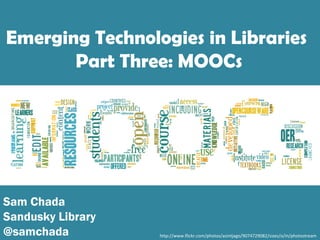PCI Webinars - Emerging Technologies in Libraries Part 3: MOOCs
- 1. http://www.flickr.com/photos/asintjago/9074729082/sizes/o/in/photostream Sam Chada Sandusky Library @samchada Emerging Technologies in Libraries Part Three: MOOCs
- 2. ŌĆó Changing Landscape: Rise of the MOOCs ŌĆó Why the library? ŌĆó Continuing Education
- 3. Changing Landscapes: Rise of the MOOCs ┬®Katarina Stefanovic
- 5. MOOCs and Open Education Timeline
- 6. MOOCs and Open Education Timeline
- 8. MOOCs and Open Education Timeline
- 9. WHAT IS IT? Massive ŌĆó Can accommodate large numbers of students, sometimes tens of thousands. Open ŌĆó Anyone can register, no institutional affiliation necessary, ŌĆśfree. Online ŌĆó Delivery, feedback, and assessment (if any) are done virtually. Sometimes supplemented with physical ŌĆśhang outsŌĆÖ. Courses ŌĆó There is a curriculum although in some cases it is very flexible.
- 10. Two Types of MOOCs xMOOCs vs. cMOOCs
- 11. Types of MOOCs cMOOCs ŌĆóFocus on knowledge creation ŌĆóEmphasis on social networked learning ŌĆóCrowd sourced learning and feedback through peer interaction xMOOCs ŌĆóFocus on knowledge duplication ŌĆóEmphasis on video presentations & quizzing ŌĆóObjective feedback from online quiz results http://www.flickr.com/photos/zen/4830488744/sizes/l/in/photostream/
- 14. MAJOR MOOC PLAYERS www.edx.org www.coursera.org www.udacity.com
- 15. MAJOR MOOC PLAYERS A nonprofit effort run jointly by MIT, Harvard, and Berkeley.
- 17. MAJOR MOOC PLAYERS A for-profit company founded by two computer-science professors from Stanford.
- 19. MAJOR MOOC PLAYERS Another for-profit company founded by a Stanford computer-science professor.
- 21. MOOCs Business Models edX Coursera Udacity ŌĆó Certification ŌĆó Certification ŌĆó Certification ŌĆó Secure assessments ŌĆó Employee recruitment ŌĆó Employee recruitment ŌĆó Sponsored high-tech skills courses ŌĆó Enterprises pay to run their own training courses ŌĆó Sponsorships ŌĆó Tuition Fees
- 24. Low completion rates almost across the board.
- 26. Why the library?
- 30. ┬®Till Hafenbrak
- 34. MOOCs for Librarians Hyperlinked Library MOOC School of Library and Information Science at San Jose State University. More info: http://slisweb.sjsu.edu/programs/ moocs/hyperlinked-library-mooc
- 35. MOOCs for Librarians New Librarianship School of Information Studies, Syracuse University More info: http://ischool.syr.edu/future/grad/newlibopencourse.aspx
- 37. Learn to Code
- 38. Learn to Code
- 39. Learn to Code
- 44. Thanks for attending! LetŌĆÖs stay connected. Email: schada@sanduskylib.org Twitter: @samchada http://www.flickr.com/photos/st3f4n/4012030328/sizes/l/in/photostream/
Editor's Notes
- http://en.wikipedia.org/wiki/Massive_open_online_course
- http://en.wikipedia.org/wiki/Massive_open_online_course
- http://en.wikipedia.org/wiki/Massive_open_online_course
- http://moocnewsandreviews.com/ultimate-guide-to-xmoocs-and-cmoocso/
- Over 6.7 million students were taking at least one online course during the fall 2011 term, an increase of 570,000 students over the previous year. Thirty-two percent of higher education students now take at least one course online. Only 2.6 percent of higher education institutions currently have a MOOC (Massive Open Online Course), another 9.4 percent report MOOCs are in the planning stages. Academic leaders remain unconvinced that MOOCs represent a sustainable method for offering online courses, but do believe they provide an important means for institutions to learn about online pedagogy. Seventy-seven percent of academic leaders rate the learning outcomes in online education as the same or superior to those in face-to-face classes. The proportion of chief academic officers who believe their faculty accept the value and legitimacy of online education has not increased ŌĆō it now stands at only 30.2 percent. The proportion of chief academic leaders who say online learning is critical to their long-term strategy is at a new high of 69.1 percent. The perception of a majority of chief academic officers at all types of institutions is lower retention rates for online courses remain a barrier to the growth of online instruction. http://sloanconsortium.org/news_press/january2013_new-study-over-67-million-students-learning-online
- A nonprofit effort run jointly by MIT, Harvard, and Berkeley. Leaders of the group say they intend to slowly add other university partners over time. edX plans to freely give away the software platform it is building to offer the free courses, so that anyone can use it to run MOOCs.
- The companyŌĆÖs model is to sign contracts with colleges that agree to use the platform to offer free courses and to get a percentage of any revenue. More than a dozen high-profile institutions, including Princeton and the U. of Virginia, have joined.
- The company, which works with individual professors rather than institutions, has attracted a range of well-known scholars. Unlike other providers of MOOCs, it has said it will focus all of its courses on computer science and related fields.
- http://www.nytimes.com/2012/11/04/education/edlife/massive-open-online-courses-are-multiplying-at-a-rapid-pace.html?pagewanted=all
- One major, and comparatively mature, role for libraries is in helping faculty ensure the materials they use to create their MOOC presentations and to assign as readings are not going to get them or their institutions into trouble. Faculty members are increasingly used to turning to the library for help with copyright, so in early discussions around making MOOCs work, the library should be front and center.
- Working with professors to clear copyright content
- Install the Google Xrays plug in and off you go. http://www.hackasaurus.org/en-US/educators/
- http://www.codecademy.com/#!/exercises/1
- http://www.mrwallpaper.com/where-the-magic-happens-wallpaper/











































